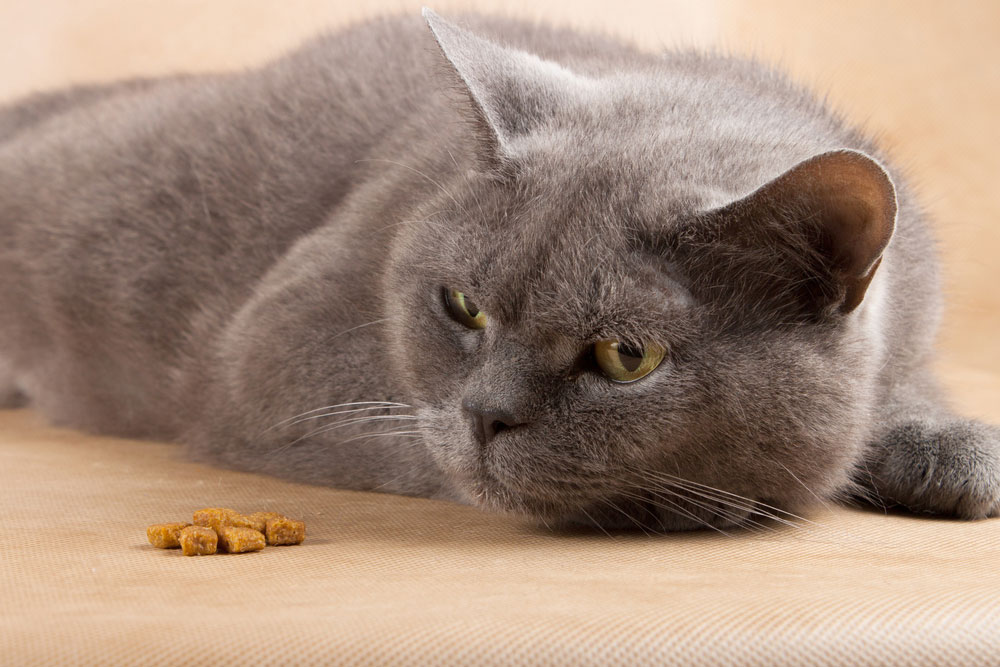Why is my cat not eating? Most cats, unlike dogs, are discerning when it comes to their palate. In fact, many cats will raise their nose at certain foods that a canine would greedily wolf down. Most cat owners have had to try a few varieties of food before their cat decided on the one. But if your cat has suddenly decided to ignore food they have previously liked, or has had a change in appetite, it’s something that you want to follow up on.
The team at Union Lake Veterinary Hospital is here to explain some reasons for lack of appetite in cats and to answer the question, “Why is my cat not eating?”
Appetite Loss in Cats
When your cat misses one or two meals, it may be a signal that there’s something serious going on. If your cat is not eating over a period of time or is having other symptoms, like vomiting, they should be examined. It is unsafe for a cat to lose too much weight too quickly. It’s important to investigate the source of this indifference to their diet.
Some common reasons for an absence of appetite in felines include:
- Gastrointestinal issues – Who doesn’t have a loss of appetite when there is stomach trouble? The digestive system is susceptible to many things, like changes in diet, toxicity, illness, parasites, and so on. Your cat could have eaten something they shouldn’t have, like chocolate, string or foil, which can result in a GI disorder or emergency. Symptoms of gastrointestinal issues include diarrhea, vomiting, attempts to vomit, not able to defecate, etc.
- Dental disease – Cats over the age of 3 will likely have some form of periodontal or dental disease. If your pet has an oral disease, it can be quite painful for them to eat, which is why their appetite decreases. There are a few conditions that can affect your cat’s dental health, like cervical line lesions (cat cavities), abscess, tooth loss/damage, and inflammation. Other signs you may notice is that your cat drools, favors one side when eating, and prefers soft food.
- Kidney disease – Kidney disease is a condition that develops in older cats. It can sometimes make your cat sick enough that they don’t eat. Telltale signs that a cat has kidney disease is that they drink more water (and urinate more) and lose weight. They can also develop mouth ulcers that can result in pain when eating.
- Foreign body – If your cat ingested something like a toy, food wrapper, curling ribbon, or other item, obviously this will make an impact on their appetite. Gastrointestinal obstruction or injury is considered a veterinary emergency.
- Toxicity – Pet poisonings occur in the hundreds of thousands each year from pets ingesting certain foods, plants, substances like antifreeze, and so on. There are many symptoms that arise from eating something poisonous and most times, the pet will display gastrointestinal issues like nausea, vomiting, and diarrhea.
- Change in diet – A lack of interest in food may just be because your cat doesn’t like their diet. Or, if you have changed their normal daily food, they may experience stomach upset. When changing diets, be sure to do so gradually, mixing the old with the new for a few weeks to avoid tummy issues. Some pets who have food allergies will experience nausea, vomiting, and so on, and may be less likely to eat. If your cat is especially picky, try giving them a few choices to see what they like best.
How to Get a Picky Cat to Eat
Once your veterinarian has ruled out health problems, there are ways you can entice your feline friend to eat. Here are a few pointers for a better appetite.
- Add wet food to their diet if it is a strictly kibble one, or add some kibble to a wet food diet.
- Flake some tuna and tuna water over your cat’s food.
- Low or no sodium chicken broth can also be added to dry food to give it better taste and moisture.
- Warm up your pet’s food to lukewarm (not too hot). Cats do not like cold food.
- Add a spoon of meat-based baby food to the bowl.
- Exercise your cat more by playing games and enjoying activities together.
Why Is My Cat Not Eating?
If you have any additional questions regarding why your cat is not eating, we can help answer them. First, we need to understand the reason for the lack of appetite in order to diagnose and treat the situation. In the best case scenario, your cat’s just a little fussy about food, and that’s easily remedied.
Bon appetit!

